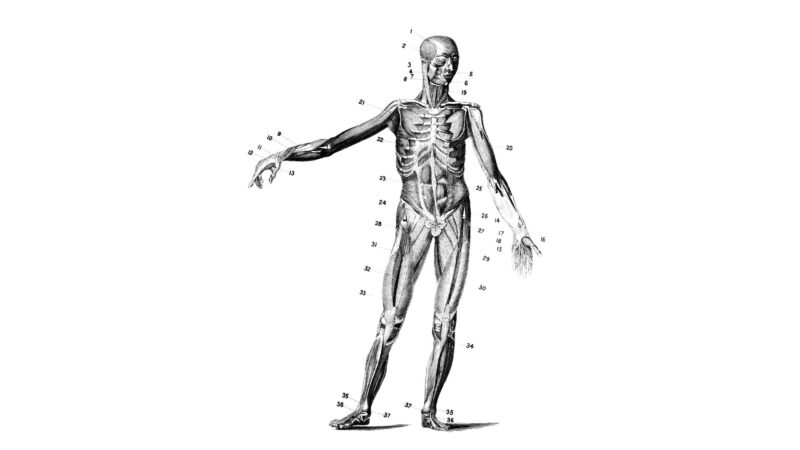This month, we parse bodies — or, perhaps more accurately, some considerations of being bodied, of what is read of bodies’ clothes, of what is read from bodies, raw. This being Guernica, the sum of our offering is contradiction.
Ellie Eberlee seeks in scientific “certainties” an explanation for her uncontrollable skin picking, a quest whose obsession threatens to overtake the behavior it seeks to elucidate. “To be consciously embodied, I think, is to undertake an endless project of watching and wondering,” she writes. “How can one refrain from asking, often obsessively, about the why of skin, marrow, and tendon — alternately angular and fleshy; scraped or battered, often by one’s own hand — with whatever vocabularies they have available?” It is a project whose failure feels inevitable and necessary. “Language falls short, yet still we crave it — to make sense of ourselves, to articulate why — even when, seemingly, it has long since ceased to matter,” she continues; “despite our wiser instincts, we remain desperate for language to capture what our bodies experience.”
As Eberlee looks for a some certainty to explain her body’s habit of unmaking itself, McKenzie Wark renounces the task. Her being of body has changed, and with it, the demands that others make of its narration. Her latest book, Love and Money, Sex and Death, is an account of how transition has changed what she remembers. “Memory here, as everywhere, is a gooey thing, sticky with the residue of the other,” writes Anahi Molina in her epistolary review of Wark’s book. Monali unpacks ways in which Wark uses writing to resist memory as a fixed singular, to renounce the self in favor of selves. “Memoir, the confessed account of the true self, is demanded of us,” Wark writes about her coming out. “Fuck that.”
Hannah Carlson reads men’s bodies — in particular, men’s hands, and where they lie. In a piece for the Cutting Room from her book Pockets: An Intimate History of How We Keep Things Close, Carlson shares a sliver of her history exposing the politics and power of what might be mistaken for a simple fashion staple.
Sanna Ghotbi reflects, in conversation with Guernica‘s April Zhu, about the solidarity one body (with a privileged passport) can perform on behalf of the many who are imprisoned by occupation. Speaking from Fukushima, Japan, on a stop in her two-year, 25,000-mile cycling tour to raise awareness about Western Sahara, Ghotbi connects her activism to her own experience as the child of Kurdish parents who left the country that claimed them.
We also have original fiction from Christopher R. Alonso and Annell López and, in Spotlights, from C.V. Joshi, in translation by Uma Shirodkar; poetry from Gustav Parker Hibbett, Anna Maria Hong, and Dimitri Psurtsev, in translation by Philip Metres; a Cutting Room excerpt from Jehanne Dubrow’s new book, Exhibitions: Essays on Art and Atrocity; and a poetic reflection by Lian Singin and Veejay Villafranca, in paired prose and photography, on the compounding crises of climate change and gender in the Philippines.

